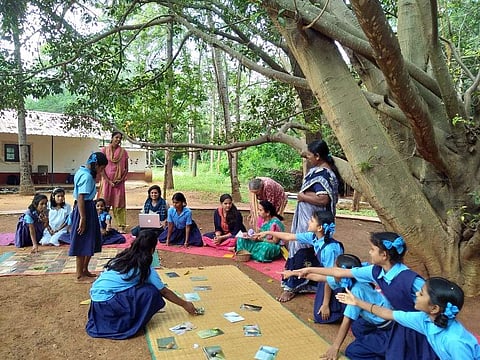

We always think that nature exists only in far away places, tucked away deep in the forest or high atop mountains, but it exists around us and we need to look for it carefully and conserve it, says Roshni Ravi, Vena Kapoor and Labonie Roy who are in charge of The Suttha Muttha Project especially meant for children. Suttha Muttha is Kannada for 'our surroundings' and creating awareness on the need to protect it is what Nature Conservation Foundation is trying to do among children. How? By introducing them to their beautiful surroundings. Roshni explains, "Nature Conservation Foundation (NCF) works on several initiatives related to the environment and The Nature Classrooms is one of them. As part of it, the Bengaluru Sustainability Forum funds our project and we work along with Jane Sahi, Founder of the Fig Tree Learning Centre. The schools that we work with are located in peri-urban spaces and the surroundings are different from what exists in the cities. With the development of cities, peri-urban spaces are also changing rapidly. As a result, it requires some special attention and care. We realised that it is important to have unique content for children to help them connect with nature. That's how this project came into existence in early 2020."
So, what's this unique content got that the prescribed textbooks don't? Jane Sahi who has been an educationist for more than three decades, explains, "We take children outside the classroom and that increases their curiosity and they end up asking several questions. For instance, during one of our visits to a government lower primary school in Tharabanahalli, we crossed paths with two Haavu Raani (Scincidae, AKA skinks). These reptiles entered the school premises and children surrounded them, armed with several questions. They asked us if Haavu Rani and snakes were similar, what happens if they bite us and so on. Similarly, the school campus had Indian gooseberry trees, Singapore cherry trees, and many other species. When we introduced these to the kids, they were surprised and happy to know how special their campus is. The content not only promotes information on these trees but also connects the children with the villagers, to know the stories behind them and any age-old riddles on these trees and so on."
While the NCF along with Fig Tree Learning Centre (FTLC) began this project in the month of February 2020, they could run it offline only for a few days. The schools shut down due to the pandemic and their plans were halted. Jane says, "We want to co-create this content and the materials along with children including their experiences. But our teachers, Sarojini, Gousia and Rebecca at the FTLC working with FTLC hail from the local community and they know the stories in these villages very well. As a result, they curated stories, DIY art, poems and activities that the children would be able to do while staying safe at their home. Besides this, we selected nature-related books for children to read in three different languages — Kannada, English and Hindi.
Currently, the project is happening at a lower primary government school in Tharabanahalli and a library centre in Khasaghattapura. They are catering to 80 school children as well as the library. "When the Vidyagama programme started, our FTLC teachers started visiting children at home to discuss what they had learnt. Besides this, we included the concept of Bingo as activity sheets in which the children had to note down their observations and experiences about nature in and around their houses. They would observe a spider or even a small ant in their house and include it in the Bingo sheets. We also asked them to make up stories or write poems on what they would do if they had eight eyes and eight legs like a spider. Some of our teachers translated the poems and short storybooks from English to Kannada to help children read and connect with them," say Jane and Roshni who want to expand this project to other government schools in the coming years.
For more on them you check ncf-india.org and bengalurusustainabilityforum.
